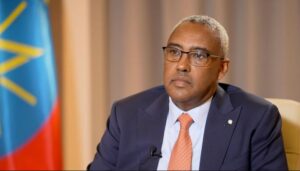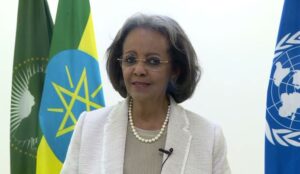Ethiopia, with its rich and ancient history, has seen various forms of governance. Since becoming a republic, the nation has had several presidents, each contributing uniquely to its development. Let’s explore the list of Ethiopian presidents, their years in office, and key highlights of their leadership.
READ ALSO: Presidents That Have Ruled Kenya Till Date
List of Presidents of Ethiopia
| President | Years in Office |
|---|---|
| Mengistu Haile Mariam | 1987 - 1991 |
| Meles Zenawi (Acting) | 1991 - 1995 |
| Negasso Gidada | 1995 - 2001 |
| Girma Wolde-Giorgis | 2001 - 2013 |
| Mulatu Teshome | 2013 - 2018 |
| Sahle-Work Zewde | 2018 - Present |
READ ALSO: Presidents That Have Ruled Seychelles Till Date
The First President of Ethiopia:

Tenure: 1987 – 1991
Mengistu Haile Mariam was the first president of Ethiopia after the establishment of the People’s Democratic Republic of Ethiopia. He was previously the leader of the Derg, the military junta that ruled Ethiopia from 1974 until the republic’s formation in 1987.
Notable Achievements
- Land Reforms: Mengistu implemented radical land reforms aimed at redistributing land from the elite to the peasantry.
- Modernization Efforts: His regime focused on modernization efforts, particularly in the military and industrial sectors.
Downsides
- Repression and Violence: His rule was marked by significant repression and violence, including the infamous Red Terror campaign, which targeted political opponents and resulted in thousands of deaths.
- Economic Decline: Despite efforts at modernization, the economy struggled, exacerbated by famine and civil unrest.
The Current President of Ethiopia:
Tenure: 2018 – Present
Sahle-Work Zewde, the current president of Ethiopia, is the country’s first female head of state. She took office in 2018 and has since been a symbol of gender equality and progress.
Notable Achievements
- Gender Equality: Sahle-Work has been a strong advocate for gender equality and women’s empowerment, both in Ethiopia and internationally.
- Diplomatic Leadership: With her extensive background in diplomacy, she has worked to strengthen Ethiopia’s foreign relations and promote peace.
Downsides
- Limited Political Power: The role of the president in Ethiopia is largely ceremonial, with limited political power to enact significant changes.
- Ongoing Conflicts: Her tenure has coincided with ongoing internal conflicts, particularly in the Tigray region, posing significant challenges to national unity and stability.
READ ALSO: Presidents That Have Ruled Chile Till Date
The Current Vice President of Ethiopia:

Tenure: 2012 – Present (as Deputy Prime Minister, since Ethiopia does not have a Vice President position, Demeke Mekonnen serves in a similar capacity)
Demeke Mekonnen has been serving as the Deputy Prime Minister and Minister of Foreign Affairs of Ethiopia. His role is crucial in the executive branch of the government.
Notable Achievements
- Educational Reforms: As a former Minister of Education, Demeke implemented several educational reforms aimed at improving access and quality.
- Diplomatic Efforts: He has been instrumental in Ethiopia’s diplomatic efforts, particularly in regional stability and peace negotiations.
Downsides
- Political Controversies: Demeke’s tenure has seen its share of political controversies and criticisms, particularly regarding the handling of internal conflicts and human rights issues.
- Economic Challenges: Despite efforts, Ethiopia continues to face significant economic challenges, including high inflation and unemployment.
READ ALSO: Presidents That Have Ruled Tunisia
Other Notable Presidents
Meles Zenawi (Acting President)
Tenure: 1991 – 1995
Meles Zenawi served as the acting president of Ethiopia after the fall of the Derg regime. He later became the Prime Minister, a position with greater executive power.
Achievements
- Economic Reforms: Meles introduced significant economic reforms that led to steady economic growth and development.
- Peace and Stability: He played a crucial role in stabilizing Ethiopia after years of civil war and unrest.
Downsides
- Authoritarian Rule: His governance style was often criticized as authoritarian, with limited tolerance for opposition.
- Human Rights Issues: His tenure faced allegations of human rights abuses and suppression of political dissent.
Negasso Gidada
Tenure: 1995 – 2001
Negasso Gidada was the first president under the new federal constitution of Ethiopia.
Achievements
- Federalism: He oversaw the implementation of the federal system of governance, aimed at accommodating Ethiopia’s diverse ethnic groups.
- Constitutional Reforms: His tenure was marked by significant constitutional reforms that laid the foundation for Ethiopia’s current political structure.
Downsides
- Limited Power: As a largely ceremonial president, he had limited power to influence policy and governance.
- Political Tensions: His presidency was marked by political tensions and challenges in the early years of Ethiopia’s federal system.
READ ALSO: Presidents That Have Ruled Ivory Coast Till Date
Girma Wolde-Giorgis
Tenure: 2001 – 2013
Girma Wolde-Giorgis served as president for over a decade, becoming one of Ethiopia’s longest-serving heads of state.
Achievements
- Environmental Advocacy: Girma was known for his strong advocacy for environmental conservation and sustainable development.
- Healthcare Improvements: His tenure saw improvements in healthcare access and infrastructure.
Downsides
- Ceremonial Role: Like his predecessors, his role was largely ceremonial, with limited direct impact on policy.
- Economic Disparities: Despite some progress, significant economic disparities persisted during his presidency.
Mulatu Teshome
Tenure: 2013 – 2018
Mulatu Teshome’s presidency continued the trend of ceremonial leadership in Ethiopia’s political landscape.
Achievements
- Economic Diplomacy: Mulatu focused on economic diplomacy, promoting Ethiopia as a destination for investment and trade.
- Infrastructure Development: His tenure supported significant infrastructure projects, contributing to economic growth.
Downsides
- Limited Influence: His ceremonial role limited his ability to influence significant political and economic changes.
- Political Unrest: His tenure coincided with periods of political unrest and protests, highlighting ongoing challenges in governance.
READ ALSO: Presidents That Have Ruled Algeria
Conclusion
Ethiopia’s journey through presidential leadership reflects its complex history and diverse society. Each president has contributed uniquely to the nation’s development, with achievements and challenges that have shaped Ethiopia’s path. As the country continues to evolve, the lessons from its past leaders will play a crucial role in informing its future.

